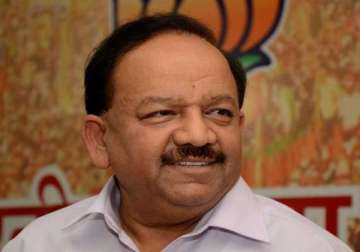New Delhi: Government today debunked the notion that a decline in smoking would affect tobacco growers and pressed upon exploring other viable alternatives to tobacco cultivation.
“It is a myth that farmers in tobacco growing regions would be impoverished if the government succeeds in getting people off the smoking habit.
“Rather, we have evidence that they would earn better incomes and free themselves from the clutches of money lenders,” the Union Health Minister Harsh Vardhan said in a statement today.
There are pilot projects which have been carried out on alternative cropping systems to tobacco which the Health Ministry is willing to share with.
“It will be proved that farmers will get better incomes from cultivating sugarcane, a variety of vegetables, pepper, fruits, mustard, etc. on the lands presently taken up by tobacco,” Vardhan said.
Accusing the tobacco companies of unscrupulous practices to woo farmers, Vardhan said these companies give lucrative terms to farmers in some regions, even full advances against estimated crop production, to ensure they do not look to alternatives.
“I will take up this issue at the Central Council of Health for persuading state health ministers to counter this practice,” he said.
Referring to the 2014 budget which proposed to raise the excise duty (from 11 to 72 percent for cigarettes, from 12 to 16 percent for pan masala, from 50 to 55 percent on gutka and from 60 to 70 percent on chewing tobacco on tobacco products) Vardhan feels this would lead to more than 3 million Indians, most of them young, to quit the dangerous habit.
“The additional earning to the exchequer is significant but the economic cost of smoking is far greater. We can only quantify the state's expenditure on cancers and TB which runs into billions of dollars annually, but what about the young lives snuffed out prematurely?” Vardhan asked.
“That too is a blow to the economy as we are losing a valuable resource to tobacco,” the Health Minister said. “There are people who argue that India earns more than $ 500 million per year through tobacco exports. To them I say, look at the net economic cost. WHO has estimated that in India it amounts to $ 1.7 billion. This cannot be tolerated any longer,” he said.
WHO has estimated that the direct medical cost of treating tobacco related diseases in India amount to $ 907 million for smoked tobacco and $ 285 million for smokeless tobacco.
The indirect morbidity costs of tobacco use, which includes the cost of caregivers and value of work loss due to illness, amounts to more than $ 500 million. Under the WHO-Framework Convention on Tobacco Control (FCTC), India is obligated to reduce the supply of tobacco.
In January 2009, the Health Ministry sanctioned Rs 2.17 crore to the Central Tobacco Research Institute (CTRI), Rajahmundhry, to carry out a pilot project on alternative cropping systems to tobacco. The project was carried out at Nandyal (Seemandhra), Anand and Dharmaj (Gujarat), Nipani (Karnataka), Vedasandur (Tamil Nadu) and Dinhata (West Bengal). The initiative was taken after consultation with Indian Council of Agricultural Research and CTRI.
Latest India News
